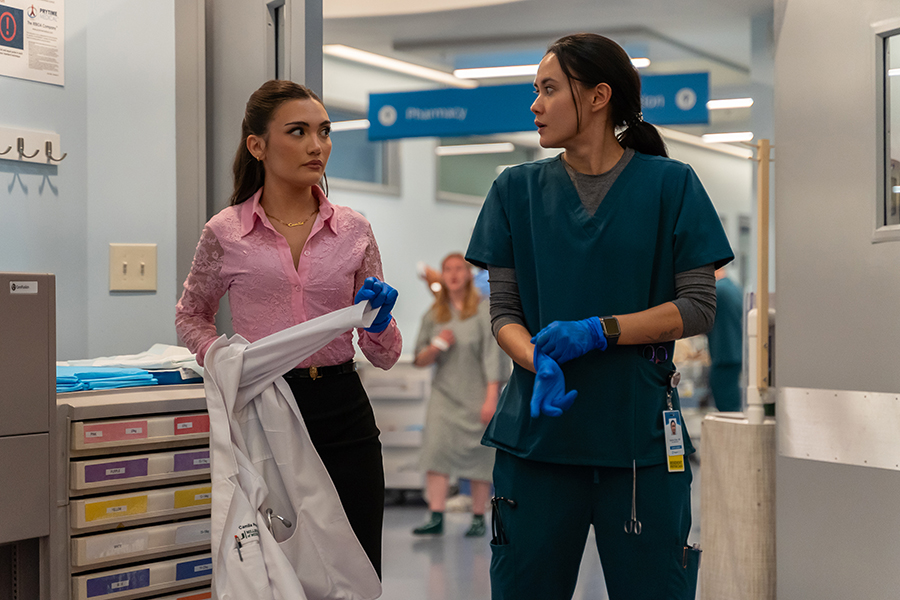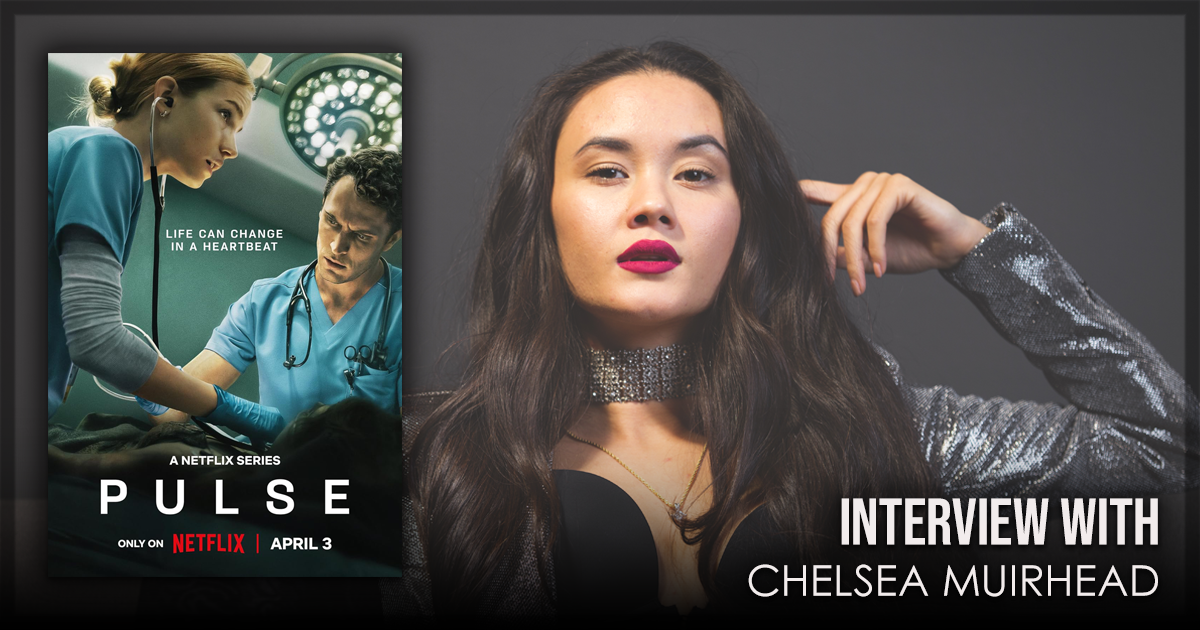If you are fascinated with medical dramas like Grey’s Anatomy, Chicago Med, and The Good Doctor, then Pulse is the next gripping series you won’t want to miss. Set in Miami’s busiest Level 1 Trauma Center, Pulse delivers high-stakes medical emergencies, intense personal dynamics, and a storm of secrets that threaten to upend the lives of its doctors. As a hurricane forces the hospital into lockdown, third-year resident Dr. Danny Simms (Willa Fitzgerald) is thrust into an unexpected leadership role, navigating life-or-death decisions and the fallout of a scandalous romance. The entire series is filled with intriguing characters, but one of the most fascinating characters is Sophie Chan, brilliantly portrayed by Chelsea Muirhead. As a determined yet anxious intern, Sophie struggles to balance the intense pressures of the ER with her own insecurities, making her journey one of the most compelling arcs in Pulse.
Muirhead, known for her roles in Warrior and Slo Pitch, showcases Sophie’s vulnerabilities with precision and provides a glimpse of how the life of a medical intern is a relentless test of resilience, self-doubt, and perseverance. I got a chance to sit down with Chelsea Muirhead to discuss the upcoming Netflix series and her character. She opened up about how Pulse helped her in learning so much about medical professionals and the field as a whole.
The Interview with Pulse’s Chelsea Muirhead
[Editor’s Note: This interview has been lightly edited for clarity.]
Aayush Sharma: When we first meet your character Sophie, the medical facility is going through a lot. But in the first scene where we see you performing a task, it turns out that Sophie is fighting her demons and insecurities. How do these personal struggles impact her work as a surgical intern?
Chelsea Muirhead: Wow, well, I think hugely, her personal issues, I think for anybody, personal issues starting to bleed into work is a precarious thing to happen, and when the stakes are as high as life and death, it gets pretty intense. When a doctor like Sophie is battling with her insecurities and anxieties, that is one of the biggest struggles—I’m sure—for anyone, let alone a doctor performing life-saving procedures. It’s like, “Girl, I hope you make the right slice and dice,” you know? But yeah, that’s one of the things she’s trying to learn—her confidence, how to have friendships, and how to ask for help—because the stakes are too high. And it does get in her way sometimes. Earlier on in the episodes, you see, right? She kind of flubs up a little bit. She gets in her own way, and it really does affect her work. All she wants is to be a good doctor. But sometimes, when you try too hard—mistakes, mistakes.
Aayush Sharma: The relationship you share with Cole is strictly professional, but he doesn’t lose a chance to show your character who is the real diva here. There are several moments where you are frustrated or angry at him. How does she handle working alongside someone like Cole, especially in such a high-stakes medical environment?
Chelsea Muirhead: Right, I think—it was actually cut, one of the scenes. There’s a scene where Cole (played by Jack Bannon) and Sophie are having a chat. I think Sophie just journals a lot. Like, she always keeps her journal with her. And, like, I’m not going to swear or scream at your face, but best believe, behind your back, I’m going to be—you know. She’s got to keep herself mentally in check, as nervous as she is. I know that she doesn’t let anyone else see her crack. And for sure, knowing that Cole is her superior—until my back needs to break, I’m going to try to keep a cool head and just keep myself, you know, collected and professional. At least until there are too many straws on my back.
Aayush Sharma: When we first meet Sophie, the hospital is undergoing major leadership changes, with Danny being unexpectedly promoted and Dr. Xander Phillips being suspended. As a surgical intern, Sophie is still trying to establish herself in a highly competitive and high-pressure environment. How does she navigate the uncertainty and shifting power dynamics in the hospital? Does she feel the need to align herself with either Danny or Phillips, or does she try to remain neutral?
Chelsea Muirhead: You know, that’s a very good question. That’s a very good question. For me, for Sophie—again, she just wants to be a good surgeon. And like, all of that stuff, even though she has a lot of personal issues, too, that start percolating to the surface, she thinks she’s keeping herself on the edges, not wanting to get mixed up in the drama. I think Sophie’s really trying to remain as neutral as possible because, like, being an intern is already so stressful. She doesn’t want to add any more to her plate, you know? So, I don’t know that she’s wanting to align any which way, but her focus is just—I’ve got to read my textbooks, I’ve got to study—she’s too busy just trying to be a surgeon.
Aayush Sharma: Your character creates a wonderful bond with Camila, and the camaraderie between you two is so amazing. It also gives viewers an idea about how instrumental it is to have someone while doing such a high-stakes job. And how much fun did you have while performing those scenes with Daniela Nieves?
Chelsea Muirhead: Oh, my gosh, it was so fun. We had the best time. She’s so cute—just so funny and talented. We had so much fun for a few days. Like, obviously, we’re in a hospital, and there are wheelchairs everywhere. Sometimes, we’d just have wheelchair races around the hospital. We had such a good time shooting. Yeah, it was really fun. And because we’re so close, I think the chemistry we have on screen comes from the fact that we’re friends in real life—or we became friends in real life. Having that trust, to just be able to play, really allows us to go after each other. And that makes it super fun. But she’s so funny. Oh, my gosh, she’s so talented.

Aayush Sharma: Throughout the season, we see medical professionals constantly on their feet—always busy, often working long shifts without going home for 24 hours or more. While you were stepping into their shoes, even just as a character, what did you learn about this profession? And what aspects of the job do you think would be the most challenging or difficult for someone to handle in real life?
Chelsea Muirhead: Wow, that’s such a good question. I learned—oh my gosh—that there’s so much. I have so much respect for doctors. And of course, after the pandemic, we’ve seen just how stressful their job is. Like you said, the hours are crazy. One of the things that—I guess this goes both to what I’ve learned and what I also don’t want people to ever experience—is the psychological warfare that doctors go through. There’s one episode—I think it’s episode five, maybe episode six—where I have a patient named Rose. Yeah, remember? That episode was just… I don’t want to spoil anything for anyone, but the loss that doctors go through and the things they have to do—it’s intense.
Sometimes, you have to administer care, and you’ve taken an oath to do no harm. But sometimes, harm gets done despite your best intentions. That was the hardest part. I have goosebumps just thinking about it. Real doctors face these gut-wrenching conversations with families every day. People literally have lives slipping from their hands. Watching someone pass away—I can’t even imagine, and I’m only fake imagining it. Real doctors truly go through that. They don’t get to spend time with their families, and—whoa—in an ER, I also learned about the things they use. They’d be rolling out trolleys with tools—like carpentry tools. I was like, “You really use this?” And they were like, “Yeah, just take this drill or saw.” It was crazy, the things doctors do. I have so much respect—so much more respect—after doing this job.
Aayush Sharma: Chelsea, one of the most powerful moments in the series is when your character realizes her own worth. It’s a pivotal scene where Cruz acknowledges her, and she comes to understand that she was seen all along, even when she thought no one, including Cruz, truly recognized her. What did that moment feel like for you, both as an actor and from your character’s perspective? Also, PULSE provides a detailed look at workplace harassment. Do you think the show handles this theme in a way that feels authentic and impactful?
Chelsea Muirhead: The first question—how I felt doing that scene—that is such a pivotal moment for Sophie. First of all, to hear those lines from Justina Machado’s mouth was pretty cool. But yeah, it’s such a pivotal moment. I think it’s in the trailer as well. To hear that—not just as Sophie, but also as Chelsea, the actor—it was so powerful, so beautiful. That’s when you can see another crack opening in Sophie, letting some light in. It was just such a healing moment for her. It felt so beautiful. That sequence—right when she says, what did she even say? Oh, right—”You still think you’re forgettable?” I think that’s such a powerful moment because it speaks to Sophie’s entire journey—one I’m sure we can all relate to. It’s about wanting to feel worthy, wanting to feel seen, just wanting to be enough. And then—for real—we are our own hardest critics. But finally, when your hero tells you, “You’re enough”—oh, it brings tears to my eyes.
For the second part of the questions, I think it does. I think it feels very authentic, especially from Danny’s perspective—Willa’s character. It’s a complicated line to walk, and it happens all the time. Not just in this situation, but in general. What’s so interesting about medical dramas isn’t just the medicine—that’s fascinating—but the personal stuff, the relationships. That HR debacle is a real thing, something I’m sure happens in hospitals. And I think the way it unfolds is so dynamic and complicated because it is a dynamic and complicated situation. It’s not just professional—it could affect someone’s work. We see, in real time, Danny and Phillips struggling to figure it out. It’s not black and white. It’s so gray. Throughout the course of the season, we watch this struggle—not just with the administration trying to handle it, but also the stress and the emotional toll it takes. The feeling of dealing with the administration is portrayed in such a raw, vulnerable way. I think we tell the story really authentically, showing how something like this could realistically unfold in the world.
Pulse is now streaming on Netflix.
You might also like…

‘Severance’ Review and Recap – Season 2 Episode 10: Cold Harbor

